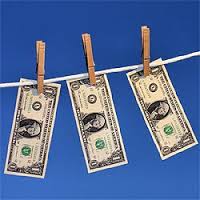 The U.S. real estate market has increasingly become a great source to hide money. For the last few years, international millionaire and billionaires around the world have figured that out.With Swiss banks getting more heartache from the U.S, they have tightened ways to hide money. So welcome to the world of U.S. real estate.
The U.S. real estate market has increasingly become a great source to hide money. For the last few years, international millionaire and billionaires around the world have figured that out.With Swiss banks getting more heartache from the U.S, they have tightened ways to hide money. So welcome to the world of U.S. real estate.Lax U.S. standards for real estate transactions make it easy for foreigners, and Americans, to purchase residential and commercial real estate – both legally and illicitly.
It’s also difficult for federal and state prosecutors to prove money laundering charges against law breakers in U.S. courts.
In addition, the federal government is doing virtually nothing to prevent real estate money laundering, allowing foreigner money to pour into U.S. real estate like never before, with little or no questions asked.
Foreign direct investment in U.S real estate amounted to $104 billion in the twelve
months that ended in March 2015- up 10.4 percent from last year, and 65 percent higher than 2013, according to a recent NAR report.
Shell companies – like limited liability corporations, or LLCs, and trusts – mask the identities of foreign, as well as domestic, buyers who are purchasing high-end homes and condominiums in the United States.
“Corrupt leaders, organized crime groups, and terrorist organizations channel large quantities of illicitly obtained funds into real estate daily as a way to disguise the criminal origin of their proceeds and to integrate them into the formal economy,”writes professor Shelley, author of “Dirty Entanglements: Corruption, Crime andTerrorism” (Cambridge University Press, 2014). “These illicit funds are invested into residential and commercial real estate as well as into farmlands and touristproperties, often allowing the criminals and corrupt politicians to enjoy the profits of their criminal activities.”Shelley said the loophole in the Patriot Act, where real estate agents and brokers aren’t required to do due diligence on who the buyers are, is fueling the rise of international real estate buyers in the U.S. “It’s hundreds of millions,” she said, stating how much illicit funds are invested each year in real SOURCE:Corrupt leaders, organized crime groups, and terrorist organizations channel large quantities of illicitly obtained funds into real
estate daily.
No one involved has any incentive to change anything since the realtors would lose their commissions.
In first six months of 2015, 75 percent of the all cash buyers in New York County had Asian surnames, according to RealtyTrac data suggesting that wealthy foreigners were buying U.S. property to shelter, or launder, their sometimes ill-gotten rubles, yuan and Euros. The article claims that New York real estate has become the new Swiss bank account, where dodgy ultra-rich foreigners are flooding the market to hide, stash – and sometimes launder their money.
RealtyTrac saw similar patterns of overseas buyers in Miami and Los Angeles.
.“The real estate community has been exempted from anti-money laundering
requirements since 2002,” said Liz Confalone, a legal fellow at Global Financial Integrity, a Washington, D.C., organization that advocates for tougher laws to combat money laundering.
“The real estate community has to do a better job at customer due diligence and
knowing the source of the funds.” Signed into law after the 9/11 terrorist attacks in 2001, the Patriot Act would have required real estate brokers and others involved in real estate closing and settlements to conduct due diligence checks on buyers and sellers.Instead, after heavy industry lobbying, the real estate industry was exempt in 2002 from verifying the identities of the buyers and screening them for potentialmoney laundering risks.
Surprisingly, no federal or state organization keeps track of the owners of American LLCs, Therefore, Corrupt leaders, organized crime groups, and terrorist organizations are able to easily channel large quantities of illicitly obtained funds into real estate daily
Wealthy foreigners are increasingly investing abroad amid political and economic
uncertainty back home, especially in left-leaning countries like Argentina, Brazil, China and
Venezuela, their governments are scaring locals to ship their wealth somewhere out of the country. So affluent and perhaps crooked individuals and companies are flooding our real estate market with no questions being asked.
While banks are required to file what’s known as Suspicious Activity Reports, or SAR, with the U.S. Treasury if they suspect a customer is depositing or transferring dirty money, real
Estate agents, lawyers and title companies have no such statutory requirement.Some of this information was retreived from RealtyTrac.

